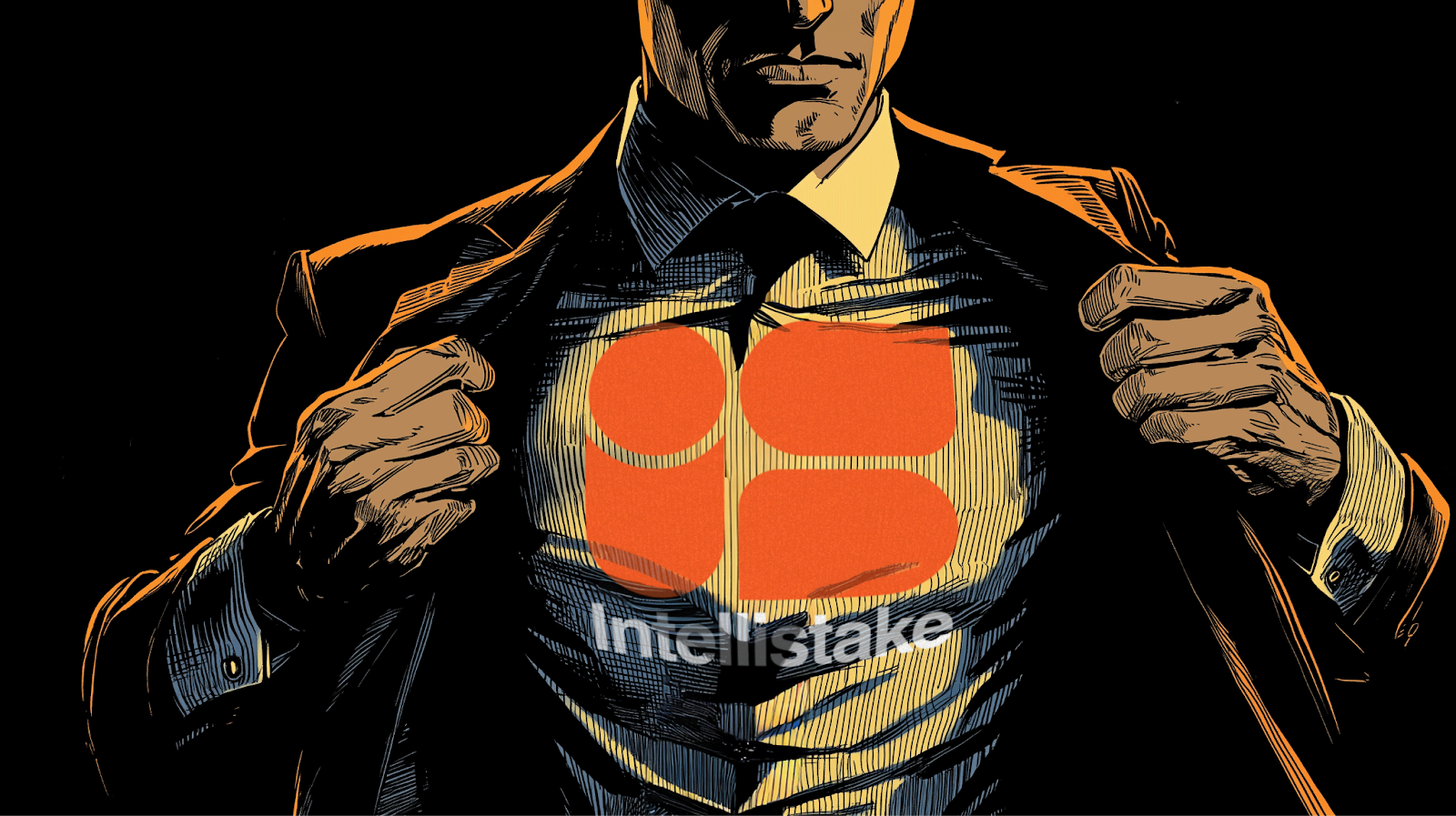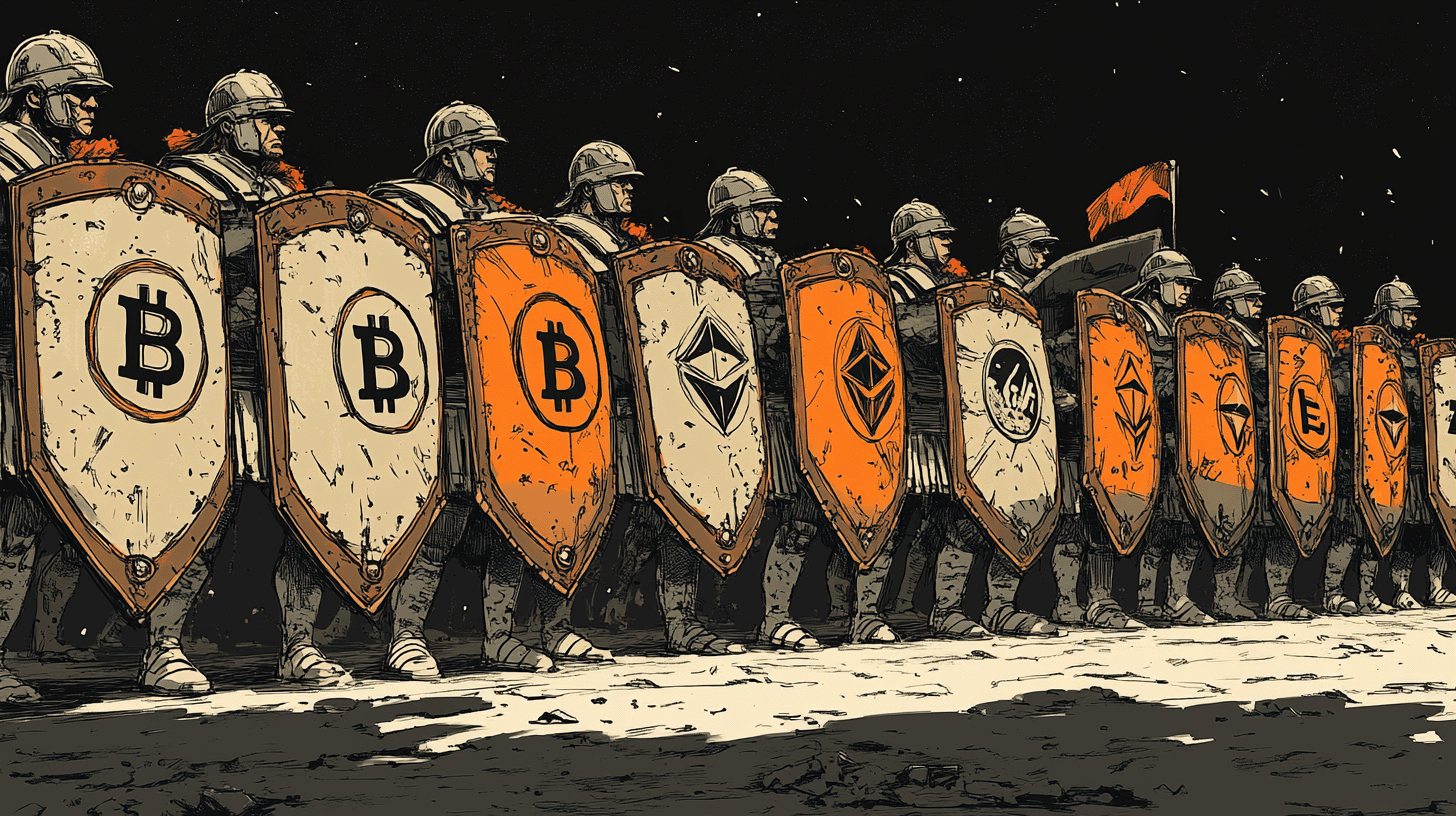After the Shock: How Renewed U.S.–China Tensions Are Proving the Strength of Digital Assets

Jason Dussault
Chief Executive Officer, Co-Founder

This Post is Disseminated on behalf of Intellistake Technologies Corp.
Markets have always reacted sharply to uncertainty, but what we're witnessing now is something more revealing. When the latest round of tariff threats between the United States and China rattled investors last week, the selloff in equities and crypto alike was immediate. Bitcoin fell more than $20,000 in hours
1. Bloomberg reports Nearly $19 billion in leveraged positions were wiped out—the largest single-day liquidation since the Terra-Luna crisis
2.
And yet, by Monday, the recovery had already begun. Bitcoin climbed back above $110,000
3. Ethereum reclaimed $4,000
4. Digital asset markets demonstrated a resilience we didn't see just a few years ago.
But beneath the price volatility, something more important happened:
the infrastructure kept running. While traders panicked and positions liquidated, blockchain networks never stopped. Validators kept processing transactions. The highways stayed open.
Two weeks ago, I wrote about
America's response to the $37 trillion debt crisis and why the real opportunity lies in building infrastructure rather than speculating on prices. This week, that infrastructure hit a milestone.
The Toll Road Analogy

Think of a blockchain network as a highway system. Data flows across it constantly—AI computations, transactions, smart contracts. It operates around the clock with no single company or government controlling it.
Validators are like digital toll booths. They verify every transaction, maintain security, and earn revenue for this service. Just like toll booths earn from traffic regardless of what vehicles use the road, validators earn rewards based on network activity.
Intellistake earns rewards from staking its own tokens, but external parties can also delegate their tokens through Intellistake's infrastructure. When they do, Intellistake earns a commission. This external delegation means someone independent assessed the infrastructure and decided to trust it with their assets.
Infrastructure Resilience During Market Chaos

During last week's chaos, blockchain networks kept operating while speculators lost billions. Token values matter and price declines impact returns, but the validator's operational role continues regardless of market sentiment.
Two weeks ago, I outlined two competing approaches to digital infrastructure. China's model is centralized and state-controlled—efficient but closed, requiring Beijing's permission. America's model is open protocols anyone can access and build on, the same strategy that built the internet.
The Genius Act, passed earlier this year, cemented America's direction by requiring all U.S.-issued stablecoins be backed entirely by cash or U.S. Treasuries. On the surface, it's a regulatory safeguard. In practice, it embeds U.S. sovereign debt directly into the code of global commerce. Every new stablecoin minted creates Treasury demand. It's financial policy executed not through central banks, but through smart contracts—extending dollar influence organically through market-driven innovation rather than state mandate.
But open infrastructure needs operators. When China builds digital infrastructure, the government runs it. When America builds open infrastructure, thousands of independent participants must run validators and maintain networks.
By operating a validator on the ASI Alliance network, Intellistake helps ensure these open systems remain strong, secure, accessible, and resilient. America's strategy wins through independent operators building better networks than centralized alternatives—but only if the infrastructure is robust enough to compete.
From Planning to Operating

This external validation transforms Intellistake from planning infrastructure to operating infrastructure others depend on. The validator is part of a larger strategy including institutional custody through the pending SVH acquisition and future asset tokenization capabilities. Most companies don't want to become infrastructure experts—they want others to handle validators, custody, security, and compliance.
In the debt crisis blog, I called this "the unsexy infrastructure that most people ignore." It's not glamorous. It doesn't make dramatic headlines. But this week proved the model works—during exactly the kind of volatility that tests everything. The toll booth is operational. The infrastructure is validated by independent participants choosing to trust it with real capital.
Last week's tariff-driven chaos is just the latest reminder that US-China tensions aren't easing—they're escalating. As that competition intensifies, the question becomes clearer: will the future run on closed systems controlled by governments, or open systems maintained by thousands of independent operators?
I can't predict how that competition plays out or what crypto prices will do. But infrastructure matters. During the internet boom, companies that owned pipes and protocols outlasted those that just built applications.
The $37 trillion debt problem isn't solved. Foreign buyers still pull back from Treasuries. But America's infrastructure bet is proving viable—not in theory, but in practice. This week showed independent operators can provide institutional-quality systems others trust, even during market stress.
Intellistake isn't speculating on outcomes. Intellistake is helping build the systems that make outcomes possible. The infrastructure shift isn't theoretical anymore. It's live. And as US-China tensions escalate, that infrastructure is proving it can withstand the pressure.
Sources
1) https://www.tradingview.com/news/newsbtc:a4b7d8789094b:0-crypto-crash-19-5-billion-wiped-out-in-record-breaking-liquidation-event/#:~:text=Bitcoin%20alone%20witnessed%20a%20%2420%2C000,and%20the%20March%202020%20crash
2) https://www.bloomberg.com/news/articles/2025-10-10/crypto-sees-more-than-3-billion-in-liquidations-in-past-hour
3) https://www.investing.com/analysis/bitcoins-rally-isnt-done-global-retail-hasnt-even-shown-up-yet-200668414
4) https://www.tradingview.com/news/coinpedia:3e8045e89094b:0-ethereum-price-under-pressure-can-eth-avoid-a-fall-below-4-000/
Disclaimer
There has been significant volatility in digital assets and their value can decline rapidly, which in turn would lead to a decline in the stock price of companies holding digital assets. Intellistake is a start-up that does not have the same access to capital as other larger more established companies.
Intellistake has just commenced operating its business and is at an early stage of development. Intellistake is entering this space by acquiring and operating blockchain validator hardware that supports AI networks and investing in AI-related digital tokens to primarily operate validator hardware.
Intellistake is developing custom AI software systems called "AI Agents" for businesses. It recently announced the development of IntelliScope, a newly designed enterprise artificial-intelligence (AI) suite that applies decentralized AI technologies to deliver transparent and verifiable corporate intelligence. IntelliScope, which is in testing, is being publicly introduced as Intellistake's enterprise AI suite, reflecting the Company's focus on advancing practical applications of decentralized AI technologies.
The IntelliScope suite is being developed as a collection of modular AI agents, each intended to address specific enterprise challenges. Development has advanced through internal closed testing, where functionality is being refined and validated. Built to leverage decentralized AI technologies developed within the ASI Alliance FET token ecosystem, IntelliScope is now preparing to move into closed beta testing with an enterprise client, a phase focused on gathering feedback to shape premium features and expand real-world use cases.
The Company intends to deliver these solutions either as one-time projects or ongoing subscription services. Revenue comes from implementation fees and monthly subscription payments. The Company does not presently have any customers. Intellistake is just commencing operations. It is targeting significant growth but its business is subject to several risks related to general business, economic and social uncertainties; the sufficiency of cash to meet liquidity needs; legislative, political and competitive developments; the inherent risks involved in the digital currency and general securities markets; the volatility of digital currency prices and the additional risks identified in the "Risk Factors" section of the Company’s filings with applicable securities regulators. Intellistake has not yet developed or commercialized its AI solutions.
The SVH transaction remains subject to completion of satisfactory due diligence, the negotiation and execution of a definitive agreement that will include representations, warranties, covenants, indemnities, termination rights, and other provisions customary for a transaction of this nature, no objection from the Canadian Securities Exchange, and shareholder approval of SVH, if required.
This report contains "forward-looking information" concerning anticipated developments and events related to the Company that may occur in the future. Forward looking information contained in this report includes, but is not limited to, all statements in respect of the Company's growth and development, the operations and business segments of the Company, expectations regarding the market for digital currencies and decentralized AI, expectations for infrastructure to support digital currencies, the SVH transaction, support for decentralized AI and blockchain networks, a broader strategy to grow the Company’s position in AI and tech digital assets, development of AI Agents and the commercialization thereof, operation of validator infrastructure, opportunities for token rewards, revenue generation potential and details regarding staking and validator operations.
In certain cases, forward-looking information can be identified by the use of words such as "expects", "intends", "anticipates" or variations of such words and phrases or state that certain actions, events or results "may", "would", or "might" suggesting future outcomes, or other expectations, assumptions, intentions or statements about future events or performance. Forward-looking information contained in this report is based on certain assumptions regarding, among other things, the Company will continue to have access to financing until it achieves profitability; the technology and blockchain industries in which the Company intends to focus its business in will grow at the rate and in the manner expected; the ability to attract and retain qualified personnel; the success of market initiatives and the ability to grow brand awareness; the ability to distribute Company's services; the Company creates strategies to mitigate risks associated with cryptocurrency price fluctuations; the Company remains compliant with all applicable laws and securities regulations; the Company engages and collaborates with local experts, as necessary, to address jurisdiction-specific matters and ensures compliance with foreign regulations to avoid penalties; the Company addresses any potential cybersecurity threats promptly and effectively; the AI Agent technology can be developed and deployed with real world applications; and the ability to successfully deploy the new business strategy as a result of the change of business. While the Company considers these assumptions to be reasonable, they may be incorrect.
Forward looking information involves known and unknown risks, uncertainties and other factors which may cause the actual results to be materially different from any future results expressed by the forward-looking information. Such factors include risks related to general business, economic and social uncertainties; failure to raise the capital necessary to fund its operations; inability to create strategies to mitigate the risks associated with cryptocurrency price fluctuations; risks relating to the ability to develop the AI Agent technology and relating to the deployment of validator operations; the ability to acquire digital tokens at reasonable acquisition prices; the costs of regulation in the digital asset industries increase to the extent that the Company is no longer generating sufficient returns for shareholders; failure to promptly and effectively address cybersecurity threats; insufficient resources to maintain its operations on a competitive basis; and the actual costs, timing and future plans differs expectations; legislative, environmental and other judicial, regulatory, political and competitive developments; the inherent risks involved in the cryptocurrency and general securities markets; the Company may not be able to profitably liquidate its current digital currency inventory, or at all; a decline in digital currency prices may have a significant negative impact on the Company's operations; the Company's success may depend on the continued involvement of key personnel, including advisors, whose involvement cannot be guaranteed; institutional adoption of decentralized AI infrastructure remains uncertain and may not occur at the pace or scale anticipated; evolving regulatory frameworks, including those related to AI (such as Canada's proposed Artificial Intelligence and Data Act), may impose additional compliance burdens or restrict certain business activities; valuation figures are based on publicly available market data and internal assessments at the time of the referenced transactions and may not reflect current or future valuations; the volatility of digital currency prices; the inherent uncertainty of cost estimates and the potential for unexpected costs and expenses, currency fluctuations; regulatory restrictions, liability, competition, loss of key employees and other related risks and uncertainties; delay or failure to receive regulatory approvals; failure to attract qualified personnel, labour disputes; and the additional risks identified in the "Risk Factors" section of the Company's filings with applicable Canadian securities regulators.
Although the Company has attempted to identify factors that could cause actual results to differ materially from those described in forward-looking information, there may be other factors that cause results not to be as anticipated. Readers should not place undue reliance on forward-looking information. The forward-looking information is made as of the date of this report. Except as required by applicable securities laws, the Company does not undertake any obligation to publicly update forward-looking information.




